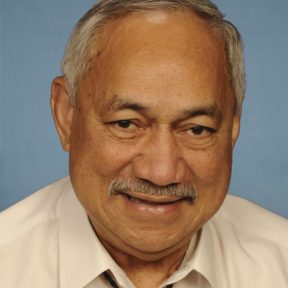
Eni F.H. Faleomavaega
: Photo from Wikimedia Commons / Author of Photo: United States CongressOverview
* Delegate to the House of Representatives from American Samoa
* Member of the Progressive Caucus
* Opposed tax cuts, favored instead giving $300 to every American
* Seafarers International Union has been among his biggest political contributors
* Passed away on February 22, 2017
Eni F.H. Faleomavaega was born in August 1943 in Vailoatai, American Samoa, and went to high school in Hawaii. After earning a political science degree at Brigham Young University in 1966, he served in the U.S. Army in Vietnam from 1966-69. He then obtained a JD degree from Houston Law School in 1972, and an LLM from the University of California at Berkeley in 1973.
Faleomavaega launched his political career in 1973 when he began a two-year stint as an administrative assistant to A. U. Fuimaono, American Samoa’s first elected representative to Washington. From 1975-81, Faleomavaega was Counsel to the House Interior & Insular Affairs Committee. He then returned home to Pago Pago, where he served as American Samoa’s Deputy Attorney General from 1981-84, and as its Lieutenant Governor from 1985-89. In 1988 Faleomavaega was elected U.S. Delegate to Congress from American Samoa; he was re-elected, sometimes narrowly, every two years thereafter for the next quarter-century. Although no party label appeared on his ballot, he ran as a self-identified Democrat.
Faleomavaega was a Member of the Congressional Progressive Caucus in the House of Representatives, and was perhaps the Caucus’s most politically moderate member; he took stands on few controversial issues. Delegates such as Faleomavaega are more like super-lobbyists than Members of Congress. They cast no binding votes — i.e., they can vote in committee but not on the House floor — and therefore they have no voting record by which their political views can be analyzed.
As matters of principle, Faleomavaega believed that:
- public and private employers alike should be legally required to implement affirmative-action hiring and promotion policies that give preference to African Americans and women, as compensation for historical injustices;
- a government-run, single-payer healthcare system would be highly desirable; and
- Social Security should remain forever under federal control, and should not be invested in anything like the stock market.
Faleomavaega opposed the tax cuts proposed by President George W. Bush in 2001, endorsing instead the Progressive Caucus’s “American People’s Dividend” — a payment of $300 to every person in America, the same for all whether a person paid very high taxes or no taxes at all. Under this plan, a husband and wife with three children would receive a refundable tax credit of $1,500, regardless of their income or tax burden.
Among Faleomavaega’s largest political contributors were the Seafarers International Union and organizations associated with the tuna industry. Nearly one-third of his territory’s population was involved in that industry.
Faleomavaega’s political career ended when he lost a bid for re-election in 2014. At that time, he was experiencing complications from his exposure to Agent Orange during the Vietnam War. Faleomavaega died slightly more than two years later, on February 22, 2017.
Additional Resources:
Further Reading: “Eni Faleomavaega … Dies at 73” (Washington Post, 2-23-2017); “American Samoa Delegate Loses Seat” (The Hill, 11-5-2014); “Eni Faleomavaega, 73, American Samoa’s Long-Serving Delegate to Congress, Dies” (NY Times, 2-23-2017); “American People’s Dividend: Give $300 to Every Person” (OnTheIssues.org); Eni Faleomavaega’s Positions on Key Issues (OnTheIssues.org).